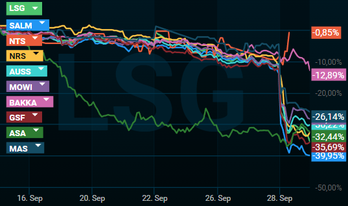Was sensitive stock exchange information astray ahead of the government’s new tax proposal – and subsequent stock market crash?
In the week before the presentation of the Norwegian government’s proposal on resource rent tax, launched on Wednesday, there has been a flood of rumours related to resource rent tax for aquaculture. No increase in production or export tax, no changes in company taxation or wealth tax. The debate has focused on resource rent tax.
This culminated on Tuesday with newspapers VG and DN in editorials loudly advocating ground rent for aquaculture.
Shortly afterwards, the government urgently called a press conference.
When the news about the prime rate broke, half an hour before the stock market opened on Wednesday, the stage was set for a price collapse. And it was – of historic proportions. By the time the Oslo stock exchange closed, the shareholders in the salmon companies had lost an incredible NOK 55.9 billion (€5.6 billion).

It seems that many people, in the political environment, in the media and possibly also the financial market had precise information about the government’s new tax package.
Expected
“There have been rumours for a reason, and several of us expected something when the state budget was presented on 6 October. When we see the debate at the forefront about what the government is launching, inside information cannot possibly be handled correctly,” Member of Parliament Ove Trellevik (Conservative Party) told SalmonBusiness.
“And when the leader of the finance committee, Labour Party’s Eigil Knudsen, a week ago was able to state that AP’s tax promise did not apply to “new taxes” (in an article in Aftenposten – editor’s note), there were many who put “two and two together”, Trellevik continued.
Read also: Historic collapse: Political decision wipes out billions in salmon shareholder values
“To me, it is quite obvious that someone has had knowledge of this, knowledge they should not have had,” he said confidently.

Observed
Trellevik’s party colleague Bård Ludvig Thorheim also reacted to the handling of stock exchange-sensitive information.
“There are very strict rules for handling stock exchange-sensitive information in the government, I am familiar with this from my own experience in the government apparatus. It is natural to question the process from the parliament’s side to make sure that all rules have been observed by the government in this process,” he told SalmonBusiness.
“We are talking about changes in very large values,” Thorheim continued.
Illegal?
The question is whether the handling of the stock exchange-sensitive information is objectionable – or criminal.
“In a case like this, there has of course been inside information in the government apparatus for some time. We do not know how it was handled, and there is therefore no reason to believe that there are any violations of the rules in their handling,” Halfdan Mellbye, lawyer and partner at SANDS, said.
“The question of whether someone has acted on the basis of inside information becomes pure speculation. Investors who have sold shares may also have sold them because, for example based on articles in the press, they feared that a new tax could come,” Mellbye said.


